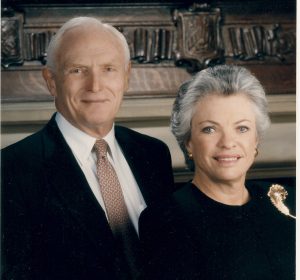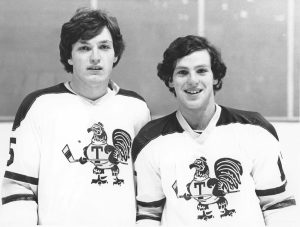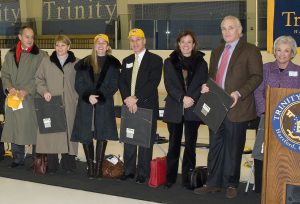As many Trinity students and alumni can attest, the lens of ‘Trinity as a family tradition’ adds layers of personal meaning—both unique and shared—when reflecting on one’s college experience. Each family’s Trinity remembrances contribute to the depth of the school’s communal story over time. Here is one story in a series about Trinity families.
The Koeppel name adorns two campus buildings, but not everyone in the Trinity community is familiar with the family’s history at Trinity or the correct pronunciation of their name: KOH-pell.
When it came to sentence structure, word usage, and pronunciation, getting the details right was important to Alfred J. Koeppel ’54, H’00, who majored in romance languages and never forgot Latin verb conjugation. According to his children, he would have loved to have been a professor, and it is hard to imagine anyone as devoted to Trinity as their father was. His passion for his school was evident in an excerpt from a January 2001 Trinity Tripod piece after he died at age 68: “[He] was buried in his Trinity blazer, the crest of his alma mater on his breast pocket, a reunion pin on one lapel and on the other, a pin emblazoned with the words ‘BEAT WESLEYAN.’”
An attorney and member of one of the oldest New York real estate families, Alfred was not the first Koeppel at Trinity; his brother, Bevin D. Koeppel ’47, preceded him. But it was Alfred’s volunteerism on Trinity’s behalf over five decades—admissions interviewer, class agent, fundraising leader, National Alumni Association executive committee member, and 15 years as a trustee, including as board chair (1990–96)—that led to him receiving the highest honors from Trinity as well as recognition from others. In a 1999 case study on nonprofit board leadership, Harvard Business Review highlighted Alfred’s decisive leadership as chairman of Trinity’s board.

The Koeppel Student Center, where the Bistro is located, is so named because of funding donated by brothers Alfred and Bevin. The Koeppel Community Sports Center (KCSC)—home to the men’s and women’s ice hockey teams and a popular space for events and activities for both Trinity and the wider community—was named in honor of Alfred, thanks to a lead gift to the building project from his wife, the late Ruth Koeppel, and his children, Caleb D. Koeppel ’78, David J. Koeppel ’80, P’18, and Sarah Koeppel Cohn ’83.
Years before any of them knew they would attend Trinity, Alfred’s three children had a tradition. Out on the Main Quad, they climbed onto one of the two antique cannons to pose for a photo. “We have several pictures of us on the cannon, as little kids and at our graduations,” said David, whose time at Trinity overlapped two years with Caleb and one year with Sarah. The three siblings all majored in American studies—Caleb also had a second major in political science—and all three went on to earn law degrees and join the family real estate business.

and David J. Koeppel ’80, P’18. (Submitted photo)
David and Caleb played varsity men’s ice hockey together; they note that in pre-KCSC days, they traveled for practices and games to a rink in Glastonbury, where the Hartford Whalers also practiced. “Hockey was a big part of my life,” said Caleb, who volunteered off-ice for his team, assisting with tasks such as sharpening skates. For his outstanding non-athletic contributions, he received the Larry Silver Award [given in memory of Lawrence Silver ’64]. “Hockey rinks are great because they are places where people are happy. That includes all the recreational leagues, public skating, and learn-to-skate programs for children,” said Caleb.
Memorable faculty members for Caleb included his political science adviser, Clyde McKee, and his American history professor, Glenn Weaver. “Weaver would smoke his cigar in class and I believe he was using the same notes he’d been using for decades, but there was something about his personality that made the subject so interesting,” said Caleb.
David and Sarah played golf together for a year, when she was a freshman and he was a senior. During that time, the varsity men’s golf team dropped “men’s” and went by “the varsity golf team.” After Trinity established a women’s golf team in 2018, Sarah became a regular supporter of the team, of which she said, “It was 35 years coming, but it finally got there.”
Sarah was not the first alumna in the family to trailblaze at Trinity. Her cousin, attorney Alyson K. Adler ’73—daughter of Alfred and Bevin’s sister, Geraldine—was the first female first-year student to sign the Matriculation book, as detailed in the winter 2019 Trinity Reporter. Alyson’s brother, attorney Edward Adler ’69, also is a Trinity alumnus.
Regarding highlights of her college years, Sarah said of Trinity’s program in Rome, “It was the best experience of my life. In terms of a life-changing growth experience, I can think of no bigger one than that semester.” After graduation, Sarah served as a Trinity volunteer, including as a trustee (2009–13).
David, who served as a Trinity class agent, said lifelong friendships with fellow alumni stand out to him. He keeps in regular contact with his Trinity friends, including from his fraternity, Psi U, from teams he played on (besides ice hockey and golf, he played soccer), and from other campus connections. There are even a few alumni who live in his building in New York City.
Among the family’s more recent Trinity graduates is David’s son, Noah Koeppel ’18, now an attorney at a large law firm in New York City. Noah recalls when, at age 12, he attended the February 2007 opening celebration at the KCSC. “I knew my grandfather had been on the board, but I don’t think I became fully aware of how big a role he had at the school until I was a student at Trinity,” he said.
For Noah, a public policy and law major, an internship at the Hartford Judicial District courthouse was among his most impactful Trinity experiences. “That fueled my interest in the law, along with a push from a few of my professors. I don’t think I would have been able to have that experience at a lot of other schools, but Trinity’s Hartford location allowed that to happen.”

David reflected on the part Alfred played in the revitalization of Trinity’s neighborhood, noting that as board chair, Alfred was involved in the development of the Learning Corridor on Broad Street across from campus, undertaken in the mid-1990s under the leadership of then-President Evan Dobelle. “That project created educational and residential opportunities in the community, while Trinity’s urban location shifted from a negative to a positive. My father understood the way to approach that, in partnership with the city, and it was a win for everybody,” said David.
Sarah added, “It’s tremendous to have such a strong family tradition, and that goes back to my father’s absolute love of all things Trinity.”
Share Your Own Trinity Story
All Trinity families—and all individual members of the Trinity community—are encouraged to share their own stories via the 200 Stories communal storytelling project.
